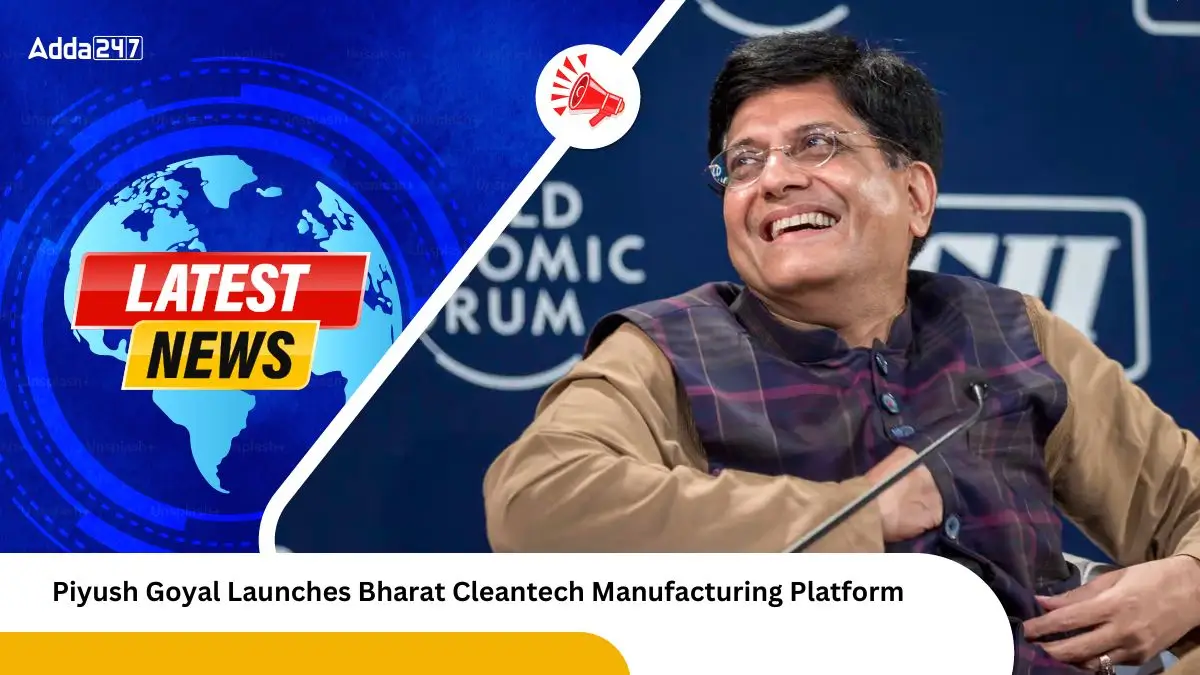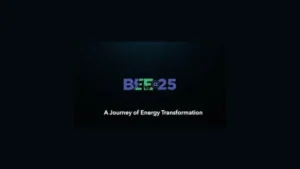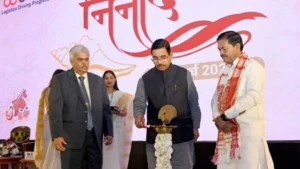Union Minister of Commerce & Industry, Shri Piyush Goyal, launched the Bharat Cleantech Manufacturing Platform during the Bharat Climate Forum 2025 in New Delhi. This initiative aims to strengthen India’s cleantech value chains in key sectors such as solar, wind, hydrogen, and battery storage. The platform is expected to enhance collaboration, innovation, and financing in the clean energy sector, making India a global leader in sustainability.
During his address, Shri Goyal stressed the importance of self-sustaining growth in the cleantech sector, highlighting that while Product Linked Incentives (PLIs) can help kickstart the industry, long-term success requires independence from government subsidies. He urged stakeholders to think innovatively, scale up manufacturing, and leverage the platform to share ideas, technologies, and resources.
Key Highlights of Platform
Objective of the Platform
- Strengthen India’s cleantech value chains in solar, wind, hydrogen, and battery storage sectors.
- Provide a platform for collaboration, co-innovation, and financing.
- Encourage Indian firms to scale up manufacturing and share resources and technologies.
Shri Piyush Goyal’s Key Messages
Self-Sustaining Growth
- PLIs and government subsidies are not a long-term solution.
- The clean energy sector must become self-reliant and independent of government support.
Think Innovatively and Scale Up
- Urged participants to increase manufacturing scale in the cleantech sector.
- Collaboration and co-innovation will help make India an attractive business case for clean energy.
Achieving India’s Clean Energy Goals
- India aims to achieve 500 GW of clean energy capacity by 2030.
- India has already achieved 200 GW of clean energy, well ahead of its 2022 target.
- Highlighted that India’s interconnected energy grid is the largest in the world.
India’s Performance in RE
- India is one of the best performers in meeting the Nationally Determined Contributions (NDCs) submitted to the UNFCCC and the Paris Agreement.
- Achieved the target of installing renewable energy by 2022, eight years ahead of schedule.
Adoption of Solar Power in India
- Gujarat was one of the first states to adopt solar power.
- Shri Goyal credited PM Modi’s leadership for making solar power affordable through transparency, fair auctions, and equal competition.
- Emphasized the government’s focus on speed, scale, and skill (3S) in renewable energy programs.
Key Benefits of Bharat Cleantech Manufacturing Platform
- Collaboration and Innovation
- Enables Indian companies to collaborate and share ideas.
- Promotes co-innovation in clean technologies.
- Financing and Resource Sharing
- Provides a platform for financing cleantech projects.
- Encourages resource and technology sharing to improve efficiency.
Global Leadership in Sustainability
- Positions India as a global leader in the cleantech sector.
- Supports India’s goal of becoming a major exporter of renewable energy technologies.
India’s Clean Energy Achievements
Milestones Details
- Achieved 200 GW of clean energy 8 years ahead of the 2022 target
- Target of 500 GW by 2030 India is on track to achieve this goal
- Largest interconnected grid India has the world’s largest energy grid
- Nationally Determined Contributions (NDCs) India is one of the best-performing countries in meeting its climate commitments
| Summary/Static | Details |
| Why in the news? | Piyush Goyal Launches Bharat Cleantech Manufacturing Platform |
| Event | Bharat Climate Forum 2025, New Delhi |
| Launched By | Union Minister Shri Piyush Goyal |
| Platform Objective | Strengthen India’s cleantech value chains in solar, wind, hydrogen, and battery storage |
| Key Message | The cleantech sector must become self-sustaining and independent of government support |
| India’s Clean Energy Target | Achieve 500 GW of clean energy by 2030 |
| Current Progress | Achieved 200 GW of clean energy, 8 years ahead of schedule |
| Benefits of the Platform | Promotes collaboration, co-innovation, financing, and resource sharing |
| India’s Renewable Achievements | Leading in meeting NDCs, affordable solar power, and having the largest energy grid |
| Emphasis by Shri Goyal | Focus on 3S – Speed, Scale, and Skill for renewable energy programs |
| Key Quote | “Respect for climate change is not new to India. Gujarat was among the first to adopt solar.” |



 Debrigarh Sanctuary To Showcases Rich Wi...
Debrigarh Sanctuary To Showcases Rich Wi...
 BEE Turns 25! Power Minister Unveils BEE...
BEE Turns 25! Power Minister Unveils BEE...
 Central Warehousing Corporation Celebrat...
Central Warehousing Corporation Celebrat...








